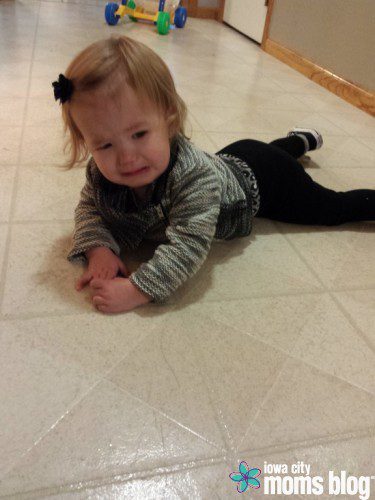Where are all my toddler moms?! Oh I see you…messy buns, messy floors, chasing around adorably messy little humans. I’m one of you now! I blinked my eyes and my tiny little baby is a full-blown toddler already. She’s a ball of fun with endless energy and a total knack for making messes, sneaking away with crayons, and staining clothes. That little stinker lights up my world in a way that I never imagined, but you know what else she does? Once a while (usually at the worst possible times), she pushes me to the brink of insanity with her toddler tantrums. Holy wow, nothing compares to the wrath of an angry toddler!
I’ll admit, sometimes I have to actually remind myself that I’m the one in charge of defusing those toxic tantrums, but now that we’re sneaking up on my daugher’s 2nd birthday, I’ve learned a few tips of the trade to help ease us both through the worst of her meltdowns. Here are a few steps to help your child through their next tantrum–or next few years of tantrums, since we’re being honest and all.
1. Stay calm.
This is probably the one most important thing you can do. No one can control their emotions when the person they’re talking to loses it. So don’t expect your toddler, who doesn’t even know what an emotion is, to be able to control his if you go bonkers and have a meltdown of your own. This doesn’t mean to pretend you’re calm by talking softly while still boiling inside. Kids are crazy intuitive; they can see right through that forced smile!
If you want any of these next tips to work, you have to be able to control your own emotions. So take a deep breath (or two). If you need to take a short break and come back to address the situation when you’ve cooled off, then do it. Your sense of calm will help your toddler regain his.
2. Remind yourself that you have no control.
You have no control. But seriously, from the moment she is born, your child is her own person with her own personality and her own likes and dislikes (she just hasn’t learned them yet). You can’t change who she is. Starting with that mindset will naturally shift your approach. You might even feel vulnerable and automatically end up showing compassion, which brings us to…
3. Show empathy.
You must do this even if you you’re late for work, or in a rush for an appointment. Taking two minutes to go through this step is a total game changer.
Bend down to his level, take his hands in yours, and ask him to look at you in the eyes. Do not continue talking until you have eye contact. Once you do, you must give no more than 2-3 short sentences; toddlers have a very short attention span. In those brief sentences you should first verbalize how you think he feels to show that you understand.
By being empathetic towards your child, you are showing him how to be empathetic, and you are educating him on emotions. The more you do this, the more he will replicate the exact same thing with others and even you!
4. Provide comfort.
There’s nothing like a good long hug from someone you love. Physical contact does crazy wondrous magic with toddlers (and husbands, ha!).
After you’ve verbalized the emotions your toddler is feeling, it’s a good time to offer a cuddle and a kiss. If they pull away, respect that (again, by respecting them, you are educating them on how to respect others). You can follow with your second sentence, something like supportive like “I love you” or “I’m here for you”. If she doesn’t want to, don’t push it.
5. Skip time-outs.
There are certain times and scenarios that may be fitting for a time-out, but for the most part there’s a reason your toddler is acting out and it’s probably not because she wants to sit in the corner by herself for a minute. Is she exhausted because she didn’t nap? Maybe she’s hungry because you forgot snack time. Have you played with her consistently in the past few days? Or maybe you’ve been in her face all weekend and she just can’t take it anymore.
Whatever the reason, a tantrum happens because kids have no other way to express their feelings, and ignoring them or using threats of punishments only creates more intense negative feelings like anger, sadness, and anxiety. It makes you more mad, and it makes it harder for them to control their feelings.
The best thing to do is to find alternatives, because when you choose a time-out or a punishment, you are creating a disconnection with your child. She may stop crying the first few times because she wants to be with you (the true intention of the tantrum), but eventually she will resent you for it. This will create one of two things: a child with low self esteem that obeys at every threat, or a defiant child that is determined to give you a run for your money. I think we can all agree that we want to raise children with a healthy level of self-esteem, a reasonable amount of respect and empathy for others, and the ability to openly communicate. This all starts at a young age which is why being a toddler mom is so very impactful.
6. Be firm & consistent.
Being firm doesn’t mean raising your voice or being verbally aggressive. It simply means to respectfully hold up your end of the deal. Your toddler should know that you will always do the same thing and that she can expect the same result, every single time. Like going to bed at the same time, and continuing to bring her back to her bed when she comes out, patiently, every single day. PATIENCE. That’s what it takes.
When you’re setting all those limits, it’s going to take a lot of energy and time on your part. But once you lay the foundation and build a respectful and trusting relationship with your toddler, the roller coaster ride is less intense. He will trust you and feel safer with you. She will look to you for guidance and will communicate with you the best she can.
What tips to you have for easing toddler tantrums? Please do share!













